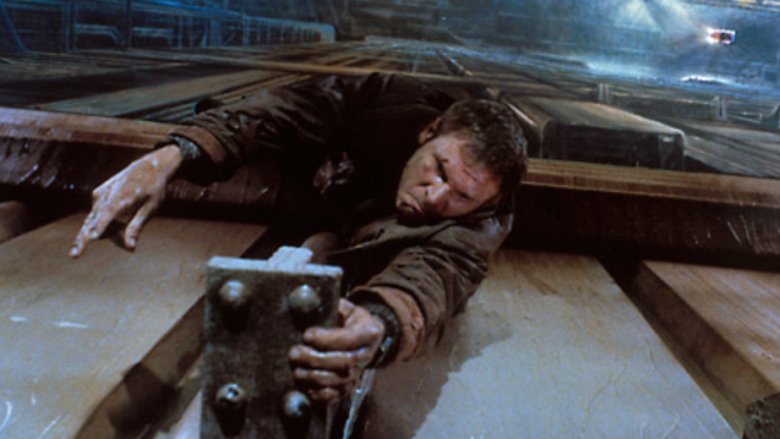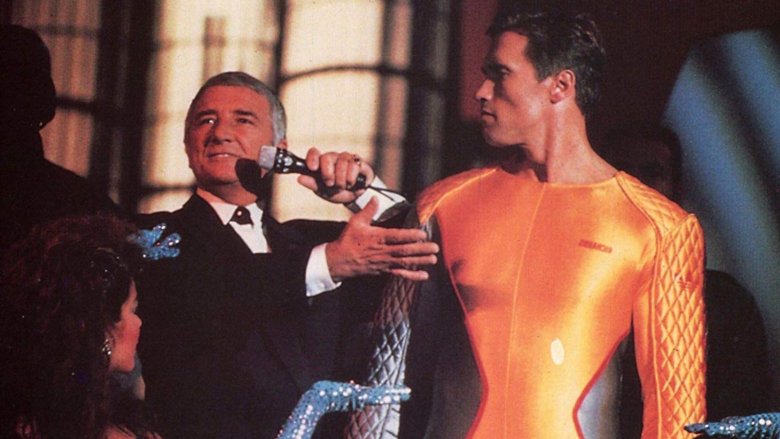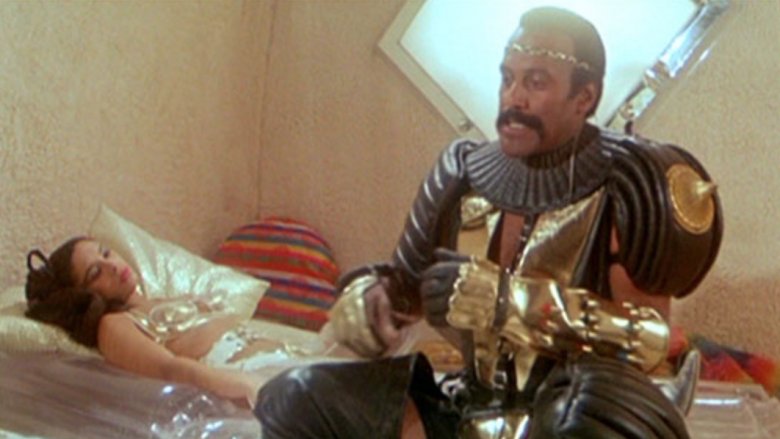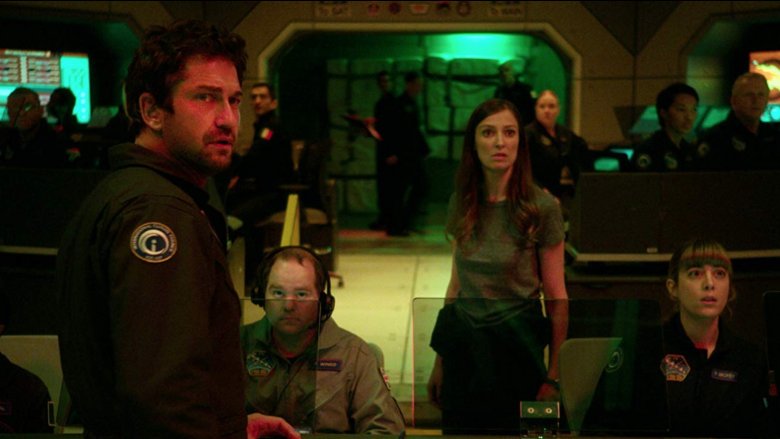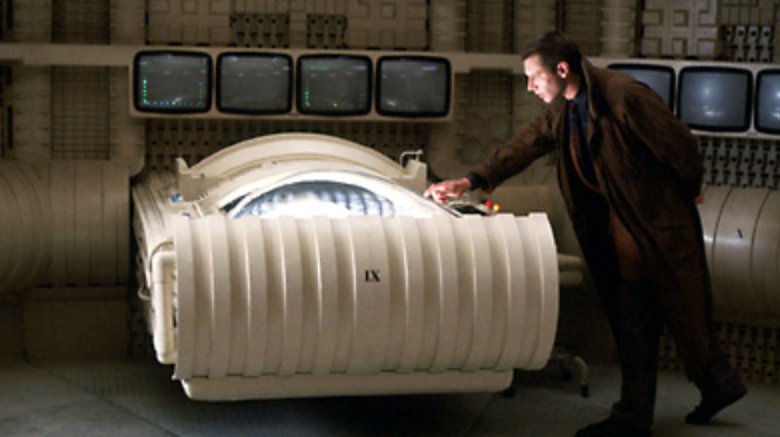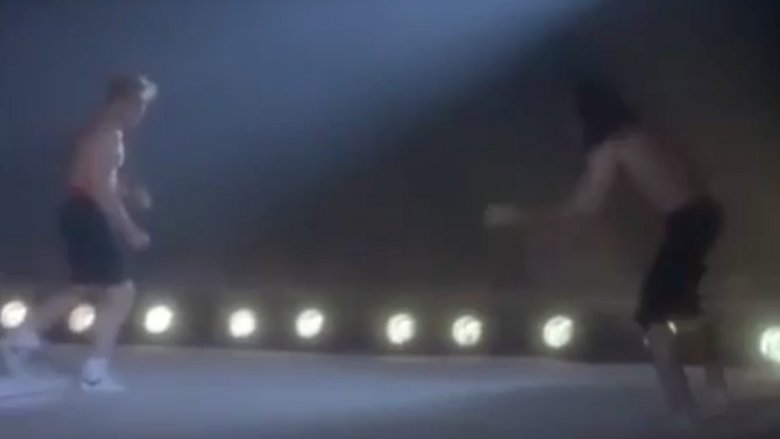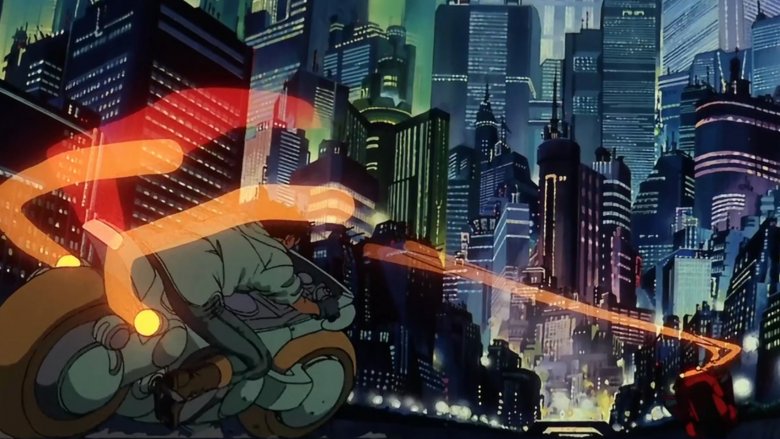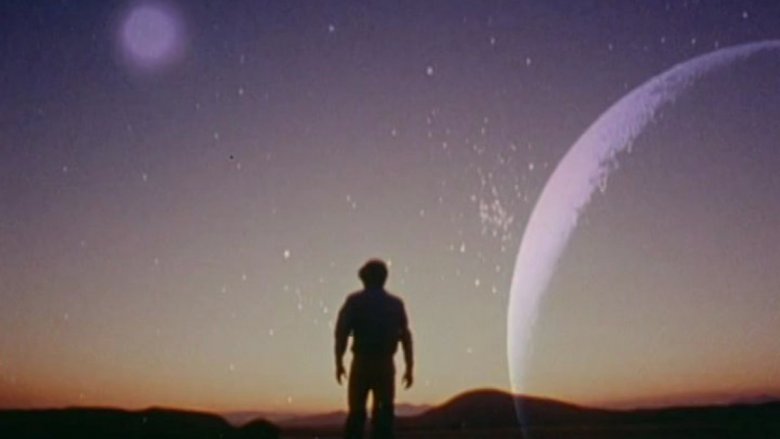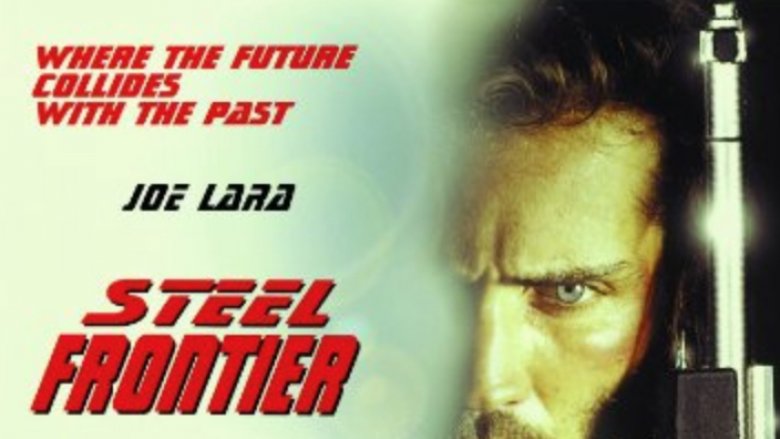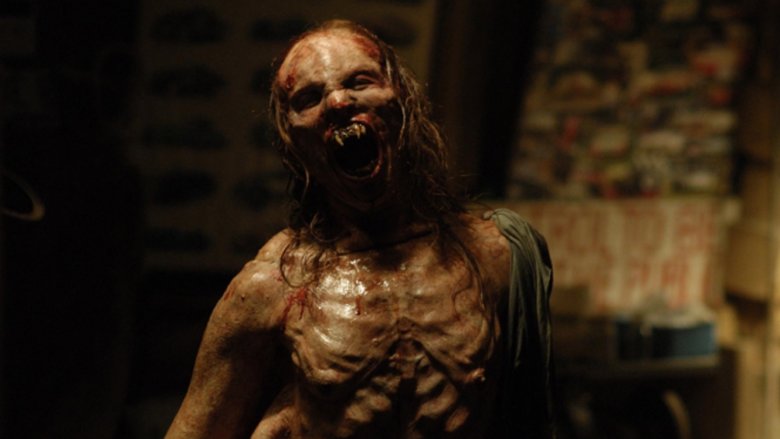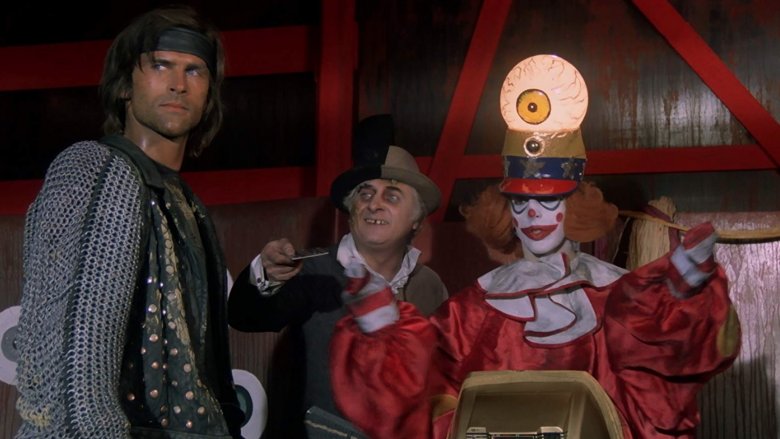What These Movies Predicted About 2019
Since our prehistoric ancestors climbed from the primordial soup and into the primordial writers' room, storytellers have loved to fantasize about the future. These fantastic musings about the future are the foundation for many of the most famous stories in all of fiction: George Orwell's 1984, H.G. Wells' The Time Machine, and Ray Bradbury's Fahrenheit 451, to name a few.
It's easy to see why storytellers are so attracted to the future — it's open season for big ideas. From Gene Roddenberry's optimistic outlook in Star Trek to James Cameron's dystopian nightmare in The Terminator, the future is fertile ground for vivid imaginations. Some of the predictions are way off (so far humans haven't been replaced by speaking simians, as Pierre Boulle predicted in Planet of the Apes), while some are startlingly prescient (HAL-9000 from 2001: A Space Odyssey has a little sister now available from Amazon). It's always fun to look at storytellers' past predictions and see how accurate they were or weren't — especially when we're living in the times they fantasized about right now.
Which brings us to 2019. For some reason, a lot of films speculated about 2019. Maybe it's because when these stories were conceived, 2019 seemed impossibly far off (feel old yet?), but here we are. Some predictions are so off the mark it's hysterical. Others are so accurate it's freaky. Brace yourselves, as we're going back to the future. Check out what these movies predicted about 2019.
Ahh-nald runs from bad guys on a warped reality TV show
The Running Man is one of the Arnold Schwarzenegger's most interesting films, though not his most popular. Released in 1987 A.C. (After Cameron), it was based on a 1982 Stephen King (writing as Richard Bachman) novel. While not one of Arnie's biggest hits (it wasn't even his biggest hit in 1987 — Predator was), The Running Man has since been reevaluated, largely because of the strange similarities between our current world and the future it predicted in 1987.
In The Running Man, America is a totalitarian police state whose most popular show is The Running Man. Convicted criminals known as "runners" must evade armed mercenaries called "stalkers" for a chance at freedom. Arnie plays a wrongfully convicted cop thrust into this gladiator-style competition. As with most of Schwarzenegger's cinema, the film is a veritable circus of over-the-top carnage and Arnold's trademark one-liners.
But buried beneath the 1980s shoot-em-up tropes is a weirdly accurate critique of criminal justice and prisoner abuse, which is increasingly part of the national dialogue. The film likewise predicts the rise of reality TV culture. Reality TV hasn't started condoning physical violence (Jackass being a notable exception), at least not yet. But many of the most popular reality TV shows do compel us to gaze voyeuristically at the emotional suffering inflicted on and by Kardashians, survivors, and "real" housewives. Even worse, none of this violence comes with Arnold's snappy quips!
Nuclear Destruction, Italian Style!
The United States isn't the only country that likes to play around in the post-apocalypse — the Italians have had their turn too! The New Barbarians is a 1983 Italian sci-fi flick released stateside as Warriors of the Wasteland in 1984. Starring former Pittsburgh Steeler and blaxploitation badass Fred Williamson, the movie isn't on anybody's "Top 10 Best Films Ever" list (except for maybe Fred's mom), but can still be considered a cult classic.
The year is 2019. Following a nuclear war, nothing is left of humanity except for bands of competing tribes. One tribe known as the Templars, seeks to purge the planet of other groups. A former Templar named Scorpion sees the error of his ways and fights to protect a group of religious colonists from destruction by the Templars. If the plot sounds remarkably similar to 1981's Mad Max II, well, imitation is the sincerest form of flattery, right?
The New Barbarians is not a prescient prognosticator of our era (thank goodness), but it is a pretty fascinating time capsule of its own. Nuclear paranoia was rampant in the 1980s, so it's no wonder that "the world after nuclear war" was a popular trope in the 1980s. This became most abundantly clear with 1983's milestone miniseries, The Day After. Fortunately, the total annihilation of human civilization due to nuclear war never came to pass, though it did produce a lot of compelling genre fiction. Should civilization ever end, dibs on the name "Scorpion."
Gerard Butler battles bad weather
Geostorm is a movie that came out in 2017, which made bold predictions about the far-distant future of... 2019. Frankly, this reminds us of the bit in Ghostbusters II where Bill Murray's Peter Venkman ridicules a writer for predicting the world would end in a few weeks.
Geostorm stars Gerard Butler as a satellite designer whose climate-control satellite malfunctions, causing weather-related catastrophes around the world. When it's time to avert disaster, you call Gerry Butler (though he couldn't stop this disaster from bombing at the box office). Geostorm sprung from the mind of Dean Devlin, co-writer and producer of Independence Day, whose frequent collaborator Roland Emmerich directed another weather-related disaster flick, The Day After Tomorrow.
Geostorm is so-so in its predictions. Satellites are becoming more sophisticated, though the weather manipulation in the film is largely junk science. Of course, humans are having a tremendous impact on the weather, but climate change has very little to do with satellites. Box office analysts think this was a big reason for the film's failure — who wants to spend $10.50 to be "entertained" by massive weather-related destruction when the real thing is currently playing on the Weather Channel?
You can't really credit Devlin for being a brilliant futurist. He's more like a guy who made a movie exaggerating natural phenomena using largely make believe "science." Jules Verne or Isaac Asimov he is not.
Blade Runner predicts a bleak future beset by isolation
Blade Runner set the modern template for the ubiquitous sci-fi sub-genre of dystopian futures. While it bombed at the box office (and so did its sequel, Blade Runner 2049) there's no denying the film's impact. Its influence can be seen in films as disparate as The Dark Knight, Ghost in the Shell, and The Fifth Element. Basically, any movie that deals with the structural and spiritual rot within a society's soul owes a debt to Ridley Scott's landmark portrayal of life in 2019.
There are seven versions of the film, but all of them have the same premise. Harrison Ford plays Rick Deckard, a blade runner (detective) who must assassinate a band of replicants (robots) in a technological, neo-noir nightmare Los Angeles. With its flying cars and holographic phone booths, the film is outlandish in its futurism. It's also premature in its predictions about self-aware robots.
Still, at its core, Blade Runner gets quite a lot correct about life in 2019. In the film, machines muse melancholically about their meaninglessness. Today, it's us humans suffering from a lack of self-actualization. With social media has come a concurrent rise in social isolation and even a questioning of our very identities. Looking at it this way, we are the replicants.
So yeah, Blade Runner was wrong about flying cars (blame the influence of The Jetsons). But when it comes to the technologically-induced despair in 2019, the film is depressingly accurate.
Michael Bay imagines a future with multiple Scarlett Johanssons
After a string of films that were loathed by critics but loved by audiences, Michael Bay set out to make a daring (if misguided) high-concept sci-fi film. The result is The Island, his first box office bomb, but a film that made interesting predictions about 2019.
Ewan McGregor plays a man living in a confined, sterile colony who begins to question his existence after his friend is chosen to go to the Island, the last uncontaminated place on earth. We come to find out McGregor's character is actually a clone of a famous person named Tom Lincoln, and he exists solely to supply organs in case this person gets sick. And you thought your job sucked.
The film has some pretty interesting ideas that unfortunately get buried beneath multiple millions of dollars worth of Michael Bay mayhem and bombast. It's also remarkably accurate in many respects. With advances in modern medical science, particularly in the fields of gene therapy and tissue replacement, bio-scientists say we're not far off from a future in which any organ or organ system can be "grown." Ethical issues and biological limits will thankfully prevent the cloning of humans, for now. Bad news if you want to have your very own copy of Ewan McGregor or Scarlett Johansson.
In the future, humans will kickbox robots
You'll be forgiven if you've never seen Heatseeker. Filmed in the Philippines and released in 1995, the movie is as obscure as it gets. You've probably never even heard of it, unless you've reached the bottom of the $5 DVD bin at Walmart (just kidding — it was only released stateside on VHS).
Set in 2019 New Manila, Keith Cooke (screen name of the real martial artist and stuntman Keith Cooke Hirabayashi) plays Chance O'Brien, the only human fighter in a kickboxing tournament for cyborgs. What already sounds like a tough gig gets much worse when an evil corporate executive kidnaps Chance's fiance and forces her to become his sex slave. Now O'Brien must get his gal pal back and take revenge on the greedy corporate fat cat who kidnapped her!
The film is a bizarre amalgamation of pretty much every martial arts tournament movie you've ever seen... but with robots! In 2019 we don't have fighting robots yet, unless you count Comedy Central and Discovery Channel's Battlebots series. And if we did, it's doubtful a human would be allowed to fight them (even if he is the guy who played Reptile in Mortal Kombat). If you want to see what other similarities the film has to our present time, you can always buy the VHS tape after you dust off the ol' VCR sitting up in your closet.
A landmark anime also predicts a post-apocalyptic future
Akira is Katsuhiro Otomo's landmark anime from 1988. The American adaptation has been racing around development hell for decades. Zac Efron was at one point attached to star and now Thor: Ragnarok director Taika Waititi has been rumored to be involved. With Hollywood's poor track record of adapting anime masterpieces (we're looking at you, Ghost in the Shell), we're crossing our fingers but not holding our breath for the Hollywood version being good.
Based on Otomo's own manga, Akira takes place in post-apocalyptic Neo-Tokyo, 2019. A teenage street racer develops telekinetic powers after being exposed to a mysterious energy source. His newfound abilities put him the middle of a battle that has the potential to destroy the world. A playful Disney-Pixar animated movie this is not.
The manga Akira came out about six months after Blade Runner was released in 1982, and you can definitely see the latter film's aesthetic influence. Once again, we have a story about a grim future in which everyday people are pitted against each other in a vicious cycle of survival of the fittest. Akira also predicts a world ravaged by the nuclear fallout of World War III, an especially disturbing premise for the Japanese people. Thankfully, the future envisioned by Akira has not come to pass, though its predictions of gang violence, political corruption, and terrorism do strike a little too close to home.
Scientology's founder isn't dead... surprise!
It's the year 2019 and it turns out L. Ron Hubbard is not dead, but is living on Mu, a Scientology theme park and rehab center on the moon. Hubbard sends an agent to Las Vegas to seduce Lockheed Martin and Richard Carlson, the latter of whom turns out to be Jack Parsons suffering from amnesia. Things just keep getting stranger in this science fiction collage film from experimental filmmaker Craig Baldwin, including appearances by the presumed deceased Aleister Crowley and Marjorie Cameron.
Mock Up On Mu is most definitely not a mega-budgeted mainstream flick, though it did make an impression when it played at the San Francisco International Film Festival and New York Film Festival in 2008. Most of the other films on this list make very definitive and dire (if outlandish) predictions about the future, giving us a glimpse into society's fears at the time they were made. Mock Up On Mu is different. Its 2019 setting is just another arbitrary plot point in a film that is rife with randomness.
To be honest, 2019 is kind of a random setting in any film really. It's as if filmmakers thought that the odd-numbered 2019 was more authentic or believable than the even-numbered 2018 or 2020. Mock Up On Mu is almost making fun of this convention... which makes sense, as it makes fun of just about everything else.
To live and die in the (new) west
Most movies set in 2019 have aesthetics we commonly associate with "the future," whether it's a nuclear-ravaged desert wasteland or an urban techno-nightmare. Steel Frontier is different, as it predicts a future that is actually like the past — the Old West, to be exact.
Steel Frontier is set in a post-apocalyptic 2019 (you may have noticed by now that there has never been a film set in a pleasant, innocuous 2019). A motorcycle-riding lone gunman named Yuma must fight a vicious band of bandits known as the United Regime, who have invaded the town of New Hope. It's basically just like every other western ever made, but in the future!
Steel Frontier is a cool concept. You can almost hear the late Don LaFontaine's voice saying, "In a world where the Old West is the new future..." We could imagine this film starring Sylvester Stallone, Arnold Schwarzenegger, Bruce Willis, or any other major action star of the mid-'90s. Alas, it stars Joe Lara, best known for his title role in Tarzan: The Epic Adventures. Perhaps in another universe, the script for this C-movie fell into the hands of a big-time producer like Jerry Bruckheimer or Joel Silver, who put together an A-List cast and multi-billion-dollar budget. Of course, then Steel Frontier would have wound up as something like Kevin Costner's The Postman, which is a far worse fate.
2019 pro tip: pack lots of garlic and wooden spikes
You know those movies that you thought looked kinda cool when they were first released, but you never saw them and now ten years later you're like, "Oh yeah, I remember that?" Daybreakers falls into that category. Blame the bland title, which sounds like any one of a thousand forgettable movies from the past 30 years.
In the year 2019, a corporation of vampires (that's not an analogy — they're literal vampires) farms what is left of the human race for blood. But a band of survivors led by a former vampire named Elvis has discovered a cure for vampirism that could save the human race. With Ethan Hawke, Willem Dafoe and Sam Neill starring in a film written and directed by horror heavyweights the Spierig Brothers, the film has some impressive credentials. Despite its solid Rotten Tomatoes rating, it opened in early January 2010 and was trounced by Avatar, Sherlock Holmes, and Alvin & The Chipmunks: The Squeakquel, though it did garner a respectable box office take.
With its arresting visual palate, high-concept storyline, and powerhouse cast, Daybreakers is definitely worth revisiting or discovering. As far as 2019 predictions go, an evil corporation using human beings for profit is hardly a Hot Take (it has been a film trope since, well, forever). However, the always welcome addition of evil vampires is much appreciated, especially considering the glut of cuddly, romantic vampire films that just plain suck. Get it? Vampire films that suck? Ah, never mind.
Escape to New York
Like The New Barbarians, 2019, After The Fall of New York is another post-apocalyptic Italian science fiction film from the early 1980s, leaving one to wonder what was in Italy's water at the time. In 2019, the Earth is devastated from nuclear destruction in the aftermath of World War III. Due to the fallout, women are no longer able to procreate. The virtuous losers of WWIII send a team of mercenaries to New York, now under control of savages, to rescue the last fertile woman on Earth.
If this film sounds like a cross between The Terminator and Children of Men, be careful not to assume that 2019, After The Fall of New York ripped the other two off. It came out in 1983, one year before the The Terminator and 9 years before P.D. James' novel Children of Men, which inspired the 2006 film. 2019 isn't nearly as good as those movies, nor is it as good as the movie it was inspired by, John Carpenter's Escape From New York.
Again, we have a film that predicted our world in 2019 would be a nuclear wasteland, and thankfully that did not come to pass. That said, the whole notion of infertility is topical. Birth rates have been plummeting in many countries in the 21st century. However, that has more to do with couples delaying or even declining to reproduce, and nothing to do with infertility due to nuclear fallout. So... there's that.
